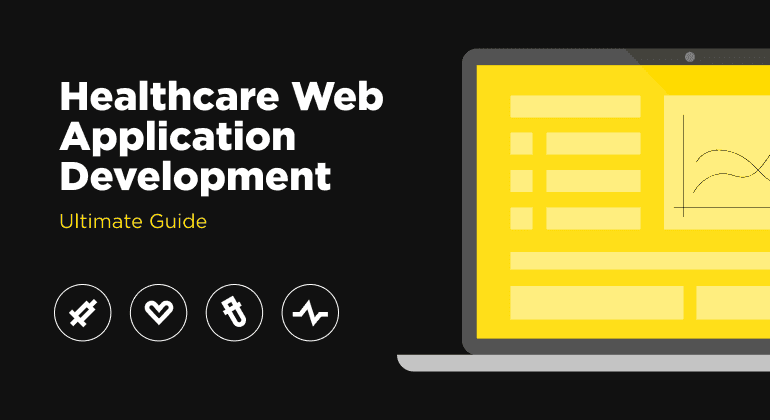Practical Guide to Real Estate Management Software Development: Best Practices and Tips
Is it hard for you to build a business in the highly competitive real estate industry? What if there is a custom solution tailored to make your company succeed by digitalizing essential business operations and moments? The real estate management app is one of the most-required software among hotels and private/commercial rental property companies.
In this expert guide, you will learn what is a real estate management system, how it helps with property management, and tips for delivering a successful project. Stick around to find out what it takes to empower your real estate business to great success!
Property Management Software Market: Stats Overlook
The real estate business is one of the leading niches that take advantage of the digitalization era. Since the Covid-19 outbreak, PropTech developers are introducing various solutions that help revolutionize each real estate industry sector, from hospitality management to real estate marketing and 3D masterplanning.
According to the Deloitte report, 40% of commercial real estate leaders stated that their companies have started with a digital transformation plan. Another trend report states that 88% of sellers used an MLS platform, and 50% used a real estate agency website to sell their property. Such dynamic highlights the digital revolution that is happening in the real estate industry.
The market is like-never welcoming innovative real estate management systems and other solutions aimed at digitalizing and optimizing the business. How does it work in reality? Let’s dive deeper to understand what PMS is and how it affects real estate companies.
Looking to Build Custom Real Estate Management Tools?
Searching for an experienced real estate management software development vendor to take over your project? Get in touch with the Otakoyi team to access the out-of-the-box solution and new-gen creative ideas!
Property Management System: What Is It and Where Can You Use It?
A real estate management or property management system (PMS) is a platform designed to help property managers and administration streamline their operations by centralizing tasks, such as reservations, accounting, housekeeping, maintenance, listings management, and more.
PMS software can be implemented as an administrative tool in various businesses across the real estate industry, such as:
- Hotels;
- Large-scale resorts;
- Commercial building;
- Apartment complexes;
- Industrial property;
- Vacation rentals;
- Private homes;
- Production and logistics business.
Property management systems help companies improve real-time visibility, enhance security, elevate guest or tenant experiences, centralize data, and streamline all business operations. Without a doubt, PMS software is an essential tool for real estate companies to operate in the digital-centric market.
Common Real Estate Management Software Types
If you want to build custom real estate management tools for your business, the first step will be to figure out what types of property management systems exist on the market.
Tenant management software: Those systems are an excellent solution for rental property management. Tenant management software fits multi-unit buildings, houses, and individual apartments. It helps landlords and property managers manage lease agreements, maintenance requests, rent collection, tenancy availability, and tenant communication.
HOA management software: These platforms are suitable for managing condominiums, homeowners associations (HOAs) properties, and community associations. Such software includes features to enhance member communications, financial management, accounting, project planning, compliance management, and more.
Hotel management systems: This software is vital for hospitality facilities, including small hotels, hostels, resorts, and large chains. Hotel management systems streamline a wide range of processes like reservations, housekeeping, room inventory management, payment processing, and more to run smoothly and seamlessly.
Office management tools: Office PMS help the administration to manage commercial building and office spaces, helping streamline various tasks, from lease agreements to maintenance and rent collection.
- Industrial PMS: Those systems make industrial property management much more efficient, including factories, warehouses, and distribution centers.
What Are The Benefits of Creating a Custom PMS App?
The real estate management software market is on the rise, offering various solutions. However, many companies struggle to implement ready-made platforms into their business workflow. Why is that? Pre-made solutions won’t fit all your business needs and may lack the crucial features you need to reach your long-term goals.
The right choice is to go the custom real estate software development route. Let’s look at why custom PMS is a much more beneficial choice.
It evolves as your business growth
Each business hopes to grow and evolve. Thus, when choosing a PMS solution, you should ensure the platform can still accommodate the needs and adapt as the business scales. Custom app development allows seamless integration with other custom-built features and enhances scalability, allowing businesses to provide an outstanding service.
It pays off in the long run
At first, it seems that building a custom property management app from scratch requires much more investment than subscribing to a pre-made solution. However, a custom app frees you from paying fees for software that’s not cut out for your needs. PMS that doesn’t fit all your business requirements will slow down success and profit growth processes. Custom PMS development pays off in the long run, allowing you to reach objectives much faster.
It requires minimum integrations
Off-the-shelf solutions still require a bit of tailoring to fit your business through multiple integrations. Unfortunately, in many cases, those third-party integrations are not always compatible and will cost a lot to make it work. With custom PMS, you can avoid such headaches by eliminating the need for multiple integrations. Tailored property management systems will fit your business flawlessly, saving you implementing time and cost.
Roadmap to Building a Property Management System
You need to understand clearly the direction you’re going and what to expect from the developing process when designing a PMS solution for a real estate company or hospitality business.
Step-by-step process of PMS software development
The real estate management software development process is no different from any other product. Therefore, your delivery team will follow the regular development process:
Stage 1. Discovery phase
The initial stage requires developers to work closely with the client to identify all project requirements, goals, and preferences. The discovery phase involves understating clients’ pain points and determining what features and functionality PMS needs to have to tackle each.
Stage 2. Wireframing
A project wireframe is a visual representation of the PMS’s interface, layout, features, and functionality. This stage is crucial for revising the project, gathering feedback, and approving further development.
Stage 3. UI/UX Design
The next step is to create a user interface and optimize the user experience. This stage includes working on visual design, color scheme, typography, and user flow.
Stage 4. Development and Testing
Back-End Development involves coding, integrations with other systems, and QA testing to ensure the PMS’s functionality and user-friendliness are on the top level. During this stage, you can as well build and launch a minimum viable product to test the project idea in real-life circumstances and learn valuable insights to make your custom PMS more effective.
Stage 5: Launch
The PMS release includes deploying software on the platform of your choice, staff training, and ongoing technical support and maintenance. If you cooperate with a professional software development vendor, you will get the post-launch team to monitor the PMS performance and implement needed updates.

Ready to build your PMS software?
Contact usChallenges to be aware of when building real estate management software
The main mistake many business owners and app creators make is to overlook the common challenges of PMS development. You don’t want to invest in a product that will fail on the market as you forgot to address the main concerns in the initial stages of development. Here are the top five real estate management systems challenges you should put on your priority list to succeed:
Compatibility with other tools and systems via API integrations. For integrations to go smoothly, you need to plan it from the jump;
UI/UX efficiency guarantees intuitive and easy-to-navigate design, allowing users to utilize the platform and reach better results;
Choosing a future-proof technology stack that won’t get irrelevant or abandoned in a couple of months or a year. Hence, guaranteeing your product stability and reliability;
Enhanced cybersecurity measures are essential if you store and manage sensitive data, like banking information, private personal details, and more.
Ongoing support contract with web developers to ensure your PMS can get needed maintenance in case of an unpredictable crash. The support team can also train end-users to guarantee everyone on the ram can operate PMS tools.
Reasons to outsource PMS software development to the team of experts
You can follow two scenarios to access the expertise and technology needed to deliver custom PMS products: hire an in-house development team or find an outsourced company. Here are why outsourcing real estate management software developers is more beneficial:
Outsourcing provides access to the team with relevant skills and expertise, saving time and resources on recruiting needed in-house crew.
You can find vendors with experience serving the real estate market and delivering successful, similar solutions.
Outsourcing frees up your time, allowing you to focus on core business activities instead of controlling the in-house development team.
You can cut development costs by saving on recruitment, workplace, and tech stack expenses.
Outsourcing shifts the risk to the vendor, who is contractually bound to deliver outstanding results, reducing the risk of project failure.
9 Must-have Property Management System features
Successful PMS comes with a variety of features, but some are essential for effective property management. Below is a list of critical features of the real estate management system every PMS app creator should implement.
Data analytics tools allow the business analyst to view critical facility reports to make data-driven decisions;
Lease management helps the administration deal with rental properties and manage tenant-related processes;
The housekeeping module helps schedule and monitor housekeeping tasks and track personnel performance;
Landlord and tenants portals needed to handle communication between tenants and management, react on time to the maintenance request, and remind about rent fees;
The accounting management feature covers all payment-related operations, from rent collection to tracking utility bills and maintenance expenses;
Payment option to help tenants or guests with secure in-app transactions;
Inventory management is a must-have feature for commercial and industrial properties to minimize equipment downtime and improve operational efficiency;
The booking module helps guests or applicants select and book accommodation, while landlords or administrations can pre-screen and approve applications;
Integrations with different rental and listing platforms centralize your property listing and publish them across multiple channels.
Various administrative tools, like calendars or listing management, help to digitalize time-consuming and repetitive tasks.
This list can be expanded or downsized depending on the specific requirements. The custom PMS app’s goal is to align functionality set with your needs and unlock the full potential for your business to thrive.
Financial Side of The Question: How Much Does it Cost to Build Custom PMS?
There is no short answer to the question. The PMS cost will depend on the project’s complexity, amount of features, the hourly rate charged by developers, and the collaboration model used with the team. Here is breaking down of the average cost of each development stage to give you an idea of how much you should expect to have to invest in the custom PMS:
- The discovery phase usually costs between $10,000 and $20,000;
- Fees for wireframing will be around $8,000;
- Based on the average hours needed to complete UI/UX design, this stage will cost another $8,000;
- The actual development (front-end, back-end, and QA testing) cost is around $50,000;
- Post-launch services like maintenance and support can reach another $50,000.
- Overall, be ready to invest between $126,000 and $136,000 for a custom property management system.
Wrapping up
The secret weapon to success in the real estate market is an effective property management system that optimizes business workflow and helps reach goals with lightning speed. However, the next challenge is to choose who you can trust with the development.
Otakoyi team has a proven track record and experience creating out-of-this-world solutions for the real estate industry from scratch. Get in touch with the crew member to explore how tailor-made PMS solutions can empower your business to thrive in the competitive environment!





